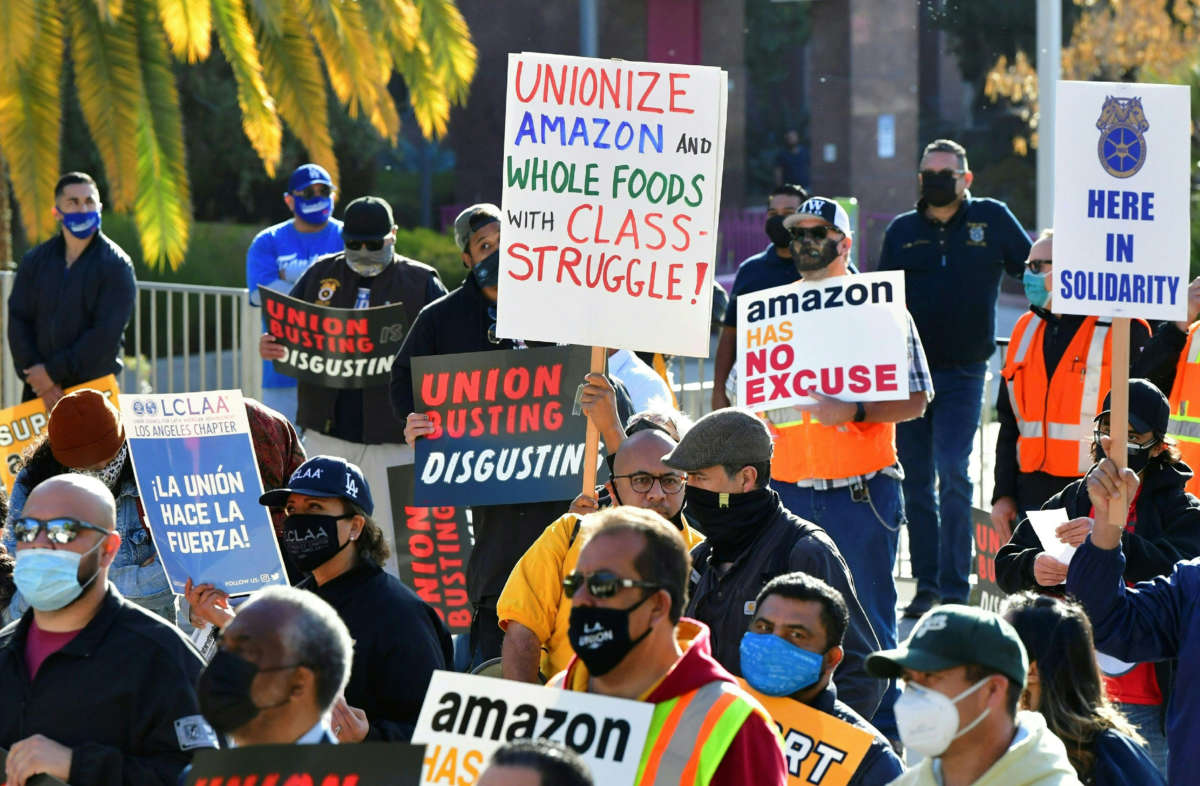The National Labor Relations Board (NLRB) will steadily lose its ability to enforce federal labor laws if Congress doesn’t pass an increase in funding for the agency before this session ends in January, the agency union is warning.
Labor union activity has massively increased across the country over the past year, and the agency says it’s struggling to keep up as it undergoes a nine-year drought in budget raises. The union says that the U.S. will soon be facing a “crisis” in labor regulation as the agency’s workload piles up and it can no longer afford to pay all of its employees.
“With fixed costs rising by [more than or equal to] 4.6 percent, the NLRB is facing budgetary Armageddon. The agency is already in a hiring freeze, and for the first time in a decade we are hearing rumblings of employee furloughs,” the NLRB union wrote. “We are DESPERATELY asking Congress to increase our budget in the coming weeks.”
If Democrats don’t increase the NLRB budget before this session of Congress ends in January, it will likely be the party’s last chance to do so for at least two years; Republicans, who are slated to take the House, will not approve NLRB budget raises. This could majorly kneecap the burgeoning labor movement and workers’ ability to challenge employers when they violate labor laws.
The union went on to warn that, if the agency’s budget isn’t increased, it is “increasingly possible” that the agency will have to begin cutting staff. Indeed, the NLRB has warned this year that the budget stagnation has already led to a loss of 39 percent of staffing overall and 50 percent of field office staff in the agency.
“This is the crisis in labor law enforcement we have warned of,” the union said. “Only Congress can prevent this catastrophe from happening by increasing the agency’s budget.”
Democrats would do well to heed the union’s warnings if they want to support the labor movement. Republicans have threatened in recent months that one of their top priorities if they take the House will be to go after the labor movement, which will likely include attacks on the NLRB and labor officials in the Biden administration.
The fact that the NLRB budget has remained stagnant for so long — amounting to a nearly 25 percent budget cut when inflation is taken into account — is largely the fault of Republicans, labor advocates say.
“We have a huge target on our backs,” labor board attorney and NLRB union legislative co-chair Michael Bilik told Politico this week. “It’s been a top priority of Republicans to prevent us from getting a single dollar of an increase.”
The final weeks of this year are “clearly the best chance we’re gonna have in the next two years” to get the budget increased, Bilik said.
American Federation of Labor and Congress of Industrial Organizations (AFL-CIO) governmental affairs director Bill Samuel also emphasized the importance of the budget issue. “At no other time in recent memory has the need for a robust and fully funded NLRB been greater,” Samuel said in a statement, per Politico. “This isn’t the time for furloughs. This is the time for funding.”
President Joe Biden has requested that Congress increase the NLRB budget from $274 million to $319 million for fiscal year 2023, but Congress has yet to pass such an increase. The agency itself has also been calling for a budget increase; NLRB General Counsel Jennifer Abruzzo said earlier this year that the funding will be necessary to “conduct hearings and elections, investigate charges, settle and litigate meritorious cases, and obtain full and prompt remedies for workers whose rights are violated.”
Labor advocates have echoed these concerns. The NLRB has been harsher on union-busting employers during the Biden administration, and its efficacy in enforcing labor law in the past years has been despite the budget shortfalls, advocates say. This was a major turnaround from the Trump administration, which worked to gut the agency and create a major backlog of cases for NLRB workers to get through.
These delays have already harmed the labor movement; as Labor Notes pointed out earlier this year, Amazon had filed dozens of objections to the union election at its first unionized warehouse and then accused the board of not properly investigating the charges when the agency had had insufficient field staff to look into them.
The company then filed charges over alleged violations because of the delay, which caused even further delays as the parties awaited a hearing. “Dragging things out is Amazon’s goal; understaffing aids that goal,” Gay Semel wrote for Labor Notes.
Trump is silencing political dissent. We appeal for your support.
Progressive nonprofits are the latest target caught in Trump’s crosshairs. With the aim of eliminating political opposition, Trump and his sycophants are working to curb government funding, constrain private foundations, and even cut tax-exempt status from organizations he dislikes.
We’re concerned, because Truthout is not immune to such bad-faith attacks.
We can only resist Trump’s attacks by cultivating a strong base of support. The right-wing mediasphere is funded comfortably by billionaire owners and venture capitalist philanthropists. At Truthout, we have you.
Our fundraising campaign is over, but we fell a bit short and still need your help. Please take a meaningful action in the fight against authoritarianism: make a one-time or monthly donation to Truthout. If you have the means, please dig deep.
